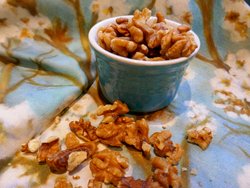 Researchers at Pennsylvania State University looking at walnuts and the gut biome, have found that eating walnuts daily as part of a healthy diet, leads to increases in certain beneficial gut bacteria associated with improvements in some risk factors for heart disease. Forty-two adults aged 30 to 65 and already identified as at risk from cardiovascular disease, were put on randomised, crossover diet trials. For the first fortnight, they consumed a standard western diet. There then followed three different six week diets to test the effects of walnuts. The walnut diet included 57 to 99 grams per day of whole walnuts. Faecal samples were collected to analyse gut bacteria.
Researchers at Pennsylvania State University looking at walnuts and the gut biome, have found that eating walnuts daily as part of a healthy diet, leads to increases in certain beneficial gut bacteria associated with improvements in some risk factors for heart disease. Forty-two adults aged 30 to 65 and already identified as at risk from cardiovascular disease, were put on randomised, crossover diet trials. For the first fortnight, they consumed a standard western diet. There then followed three different six week diets to test the effects of walnuts. The walnut diet included 57 to 99 grams per day of whole walnuts. Faecal samples were collected to analyse gut bacteria.
The team found that after the walnut diet, there were significant associations between changes in gut bacteria and risk factors for heart disease. Eubacterium eligens was inversely associated with changes in several different measures of blood pressure, suggesting that an increase in Eubacterium eligens was associated with reductions in those risk factors. Additionally, greater numbers of Lachnospiraceae were associated with reductions in blood pressure, total cholesterol, and non-HDL cholesterol.
Kristina Petersen, assistant research professor, said “Replacing your usual snack, especially if it’s an unhealthy snack, with walnuts is a small change you can make to improve your diet. Substantial evidence shows that small improvements in diet greatly benefit health. Eating two to three ounces of walnuts a day as part of a healthy diet could be a good way to improve gut health and reduce the risk of heart disease.”
(Walnuts and Vegetable Oils Containing Oleic Acid Differentially Affect the Gut Microbiota and Associations with Cardiovascular Risk Factors: Follow-up of a Randomized, Controlled, Feeding Trial in Adults at Risk for Cardiovascular Disease. The Journal of Nutrition, 18 December 2019.)

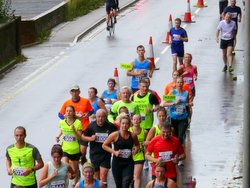 The headline above is unlikely to surprise you. However, researchers at University College London, found that just six months of training for a first marathon, resulted in an aorta (the main artery from the heart) with a flexibility equivalent to that of someone four years younger. The greatest benefits were reaped by older, slower, male marathon runners with higher baseline blood pressure.
The headline above is unlikely to surprise you. However, researchers at University College London, found that just six months of training for a first marathon, resulted in an aorta (the main artery from the heart) with a flexibility equivalent to that of someone four years younger. The greatest benefits were reaped by older, slower, male marathon runners with higher baseline blood pressure.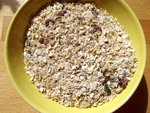 Beginning with breakfast, have an oat-based cereal eg museli, or make some oat porridge: oats contain a type of fibre known as beta-glucan which stimulates the white blood cells and macrophage cells of our immune system.
Beginning with breakfast, have an oat-based cereal eg museli, or make some oat porridge: oats contain a type of fibre known as beta-glucan which stimulates the white blood cells and macrophage cells of our immune system. 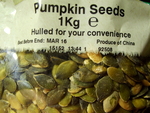 This is also an opportunity to get some extra zinc by sprinkling a small palmful of pumpkin seeds over your cereal: in the laboratory, zinc has been shown to stop the cold virus multiplying, but studies also suggest it can shorten the duration of a cold (
This is also an opportunity to get some extra zinc by sprinkling a small palmful of pumpkin seeds over your cereal: in the laboratory, zinc has been shown to stop the cold virus multiplying, but studies also suggest it can shorten the duration of a cold (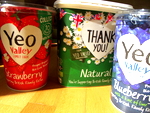 Another ingredient you might like to include with breakfast, is a probiotic preparation, such as live or bio yoghurt, kefir, Yakult or Actimel. Probiotics appear to be useful in preventing upper respiratory tract infections (
Another ingredient you might like to include with breakfast, is a probiotic preparation, such as live or bio yoghurt, kefir, Yakult or Actimel. Probiotics appear to be useful in preventing upper respiratory tract infections (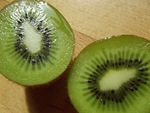 Finally, as regular intake of vitamin C appears to slightly shorten the duration and severity of a cold in some individuals (
Finally, as regular intake of vitamin C appears to slightly shorten the duration and severity of a cold in some individuals (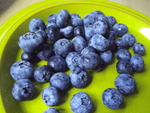 A laboratory study suggests blueberries might also hold promise as an immune system aid (
A laboratory study suggests blueberries might also hold promise as an immune system aid (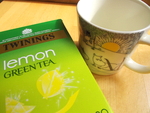 Having followed all that breakfast advice, we could turn to a mid-morning cup of tea. Black, green and white tea all contain catechins which seem according to a
Having followed all that breakfast advice, we could turn to a mid-morning cup of tea. Black, green and white tea all contain catechins which seem according to a 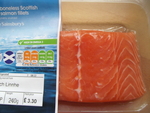 On to lunch or dinner, oily fish such as salmon, herring or mackerel offers you the benefits of omega-3 oils. Work done at
On to lunch or dinner, oily fish such as salmon, herring or mackerel offers you the benefits of omega-3 oils. Work done at 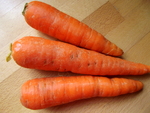 So consider a smoked salmon sandwich for lunch, or for a hot meal, have a salmon steak with which you could include sweet potato and carrots; these are rich in beta-carotene which the body converts to vitamin A and which performs a wide range of functions in the immune system.
So consider a smoked salmon sandwich for lunch, or for a hot meal, have a salmon steak with which you could include sweet potato and carrots; these are rich in beta-carotene which the body converts to vitamin A and which performs a wide range of functions in the immune system. 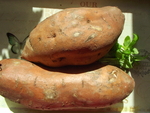 The salmon is also providing you with vitamin D, which like vitamin A, enables an array of immune system processes. Your breakfast milk and yoghurt will have contained vitamin D too.
The salmon is also providing you with vitamin D, which like vitamin A, enables an array of immune system processes. Your breakfast milk and yoghurt will have contained vitamin D too. If you are looking for a light evening meal, try a mushroom omelette: the eggs and mushrooms offer more vitamin D, whilst the protein contains the essential amino acid building blocks for our immune system cells.
If you are looking for a light evening meal, try a mushroom omelette: the eggs and mushrooms offer more vitamin D, whilst the protein contains the essential amino acid building blocks for our immune system cells. 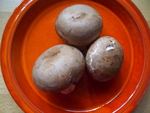 (You can significantly enhance the vitamin D content of your mushrooms by leaving them gills upwards in sunshine for an hour after buying them.) There are other ingredients in mushrooms which further support immune function.
(You can significantly enhance the vitamin D content of your mushrooms by leaving them gills upwards in sunshine for an hour after buying them.) There are other ingredients in mushrooms which further support immune function. 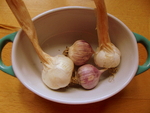 If it’s to your taste, add some garlic: a
If it’s to your taste, add some garlic: a  Secondly, following diet, try to get sufficient sleep, avoid overwork, and keep stress levels down.
Secondly, following diet, try to get sufficient sleep, avoid overwork, and keep stress levels down.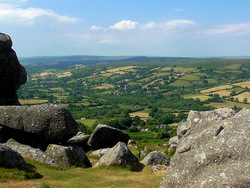 Authors from the Universities of Exeter, Uppsala in Sweden and Michigan in the US, have collaborated to examine the effects of time spent in nature, on health and wellbeing.
Authors from the Universities of Exeter, Uppsala in Sweden and Michigan in the US, have collaborated to examine the effects of time spent in nature, on health and wellbeing.  The researchers say one explanation for their findings may be that time spent in nature is a proxy for physical activity, and it is this which is driving the relationship, rather than nature contact itself. Although they tried to control for this by asking participants about physical activity, they were unable to completely separate one effect from another. Experimental research however, indicates that some benefits cannot be due solely to physical activity. Research into shinrin-yoku (Japanese “forest bathing”), suggests that various psycho-physiological benefits can be gained from merely sitting passively in natural settings.
The researchers say one explanation for their findings may be that time spent in nature is a proxy for physical activity, and it is this which is driving the relationship, rather than nature contact itself. Although they tried to control for this by asking participants about physical activity, they were unable to completely separate one effect from another. Experimental research however, indicates that some benefits cannot be due solely to physical activity. Research into shinrin-yoku (Japanese “forest bathing”), suggests that various psycho-physiological benefits can be gained from merely sitting passively in natural settings.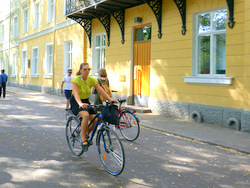 A new study on cycling and health undertaken across seven European cities reveals that it is the mode of transport associated with the greatest health benefits. Cyclists experience better self-perceived general health and better mental health.
A new study on cycling and health undertaken across seven European cities reveals that it is the mode of transport associated with the greatest health benefits. Cyclists experience better self-perceived general health and better mental health.